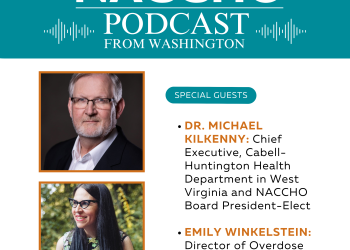 By LaMar Hasbrouck, MD, MPH, Executive Director, NACCHO
By LaMar Hasbrouck, MD, MPH, Executive Director, NACCHO
November is Lung Cancer Awareness Month, a time for local health departments (LHDs) to reflect on the burden of lung cancer in their communities, raise awareness about screening and prevention, and commit to efforts that prevent this deadly disease.
According to the American Lung Association, lung cancer is the leading type of cancer death among both men and women. It causes more deaths than colorectal, breast, and prostate cancers combined. This year alone, the American Cancer Society estimates that nearly 160,000 Americans will die from lung cancer.
Lung cancer also disproportionately affects minorities. The American Lung Association estimates that the age-adjusted lung cancer incidence rate among black men is 32% higher than for white men, even though their overall exposure to cigarette smoke, the primary risk factor for lung cancer, is lower.
Smoking is the number one risk factor for developing lung cancer. Smoking contributes to 80 to 90% of lung cancer deaths in women and men, respectively, according to the American Lung Association. Men who smoke are 23 times more likely to develop lung cancer; women are 13 times more likely, compared to people who never smoked.
NACCHO is dedicated to helping LHDs mitigate the devastating impact of lung cancer in their communities through effective resources, evidence-based practices, and sound policies that promote health and well-being.
Comprehensive Cancer Control
Comprehensive Cancer Control (CCC) consists of collaborative strategies to leverage community resources for cancer prevention, early detection, and treatment. Common CCC strategies focus on reducing cancer risk, promoting healthy lifestyles, ensuring access to screenings/diagnostic technologies, improving the quality of treatment, and expanding support services to enhance survivorship.
NACCHO’s CCC toolkit contains resources, tools, and tips that cancer prevention practitioners can use to promote effective CCC strategies. The toolkit supplements NACCHO’s Cancer Control Action Guide, based on a 2011–2012 assessment of cancer control in LHDs. The guide helps LHDs build and sustain local coalitions through seven different frames: capacity, stakeholder engagement, leadership, strategic planning, cross-coalition collaboration, visibility, and data and measurement.
Tobacco Control
NACCHO offers a variety of tobacco control programs and resources. The Chronic Disease Prevention Toolkit contains tobacco control tools on preemption, cessation, regulation, and funding. NACCHO’s board of directors has passed several policy statements that can help LHDs advocate for tobacco policies that support the health of their communities.
NACCHO has also developed positions on emerging tobacco products such as e-cigarettes and hookah, which are creating regulation challenges at the local, state, and national levels. NACCHO’s position statements encourage regulating e-cigarettes to the extent that the law allows for tobacco products.
LHDs in Action
According to NACCHO’s 2013 National Profile of Local Health Departments, 68% of LHDs provide population-based primary prevention services related to tobacco control.
The Kanawha-Charleston (WV) Health Department and the Kanawha Coalition for Community Health Improvement developed the Clean Living Environment in Appalachian Neighborhoods (CLEAN) initiative to lessen the mobility and mortality due to secondhand smoke, for which the health department won a NACCHO Model Practice Award in 2013.
In 2008, the health department instituted a comprehensive clean indoor air regulation. Many residents and business owners were opposed to the expansion of the clean indoor air regulation to bars and gaming establishments. To raise awareness of the importance of the regulation and gain public support, Kanawha-Charleston Health Department used the CLEAN initiative to develop a social marketing campaign highlighting the positive effects of the regulation. The campaign’s upbeat and positive message promoted the health benefits of avoiding secondhand smoke and encouraged the public’s continued patronage and support of smoke-free businesses.
In 2011, Ingham County (MI) Health Department won a NACCHO Model Practice Award for the program Building Effective Tobacco Treatment Services for Pregnant and Parenting Women. The program provided home-based smoking cessation education and support to pregnant and parenting women who smoke. The program delivered services using a relationship-based model of care and targeted low-income pregnant and parenting women who smoked and received services at the health department. The practice was strategically integrated into existing home-visiting services to ensure its sustainability. In just a few years, the program served more than 200 women.
NACCHO Resources
NACCHO has developed a variety of resources to help LHDs develop and implement programs to address the root causes of lung cancer in their communities.
NACCHO’s Local Comprehensive Cancer Control Website
http://www.lhdcancer.org
Action Guide for Building Local Comprehensive Cancer Control Coalitions: Lessons Learned from Local Health Departments
http://eweb.naccho.org/prd/?na486pdf
Overview of Comprehensive Tobacco Control Strategies for Local Health Departments (issue brief)
http://eweb.naccho.org/prd/?na426pdf
Tobacco Policy Statements
http://naccho.org/advocacy/positions/tobacco.cfm
Tobacco Webpage
http://naccho.org/topics/hpdp/tobacco/resources/








